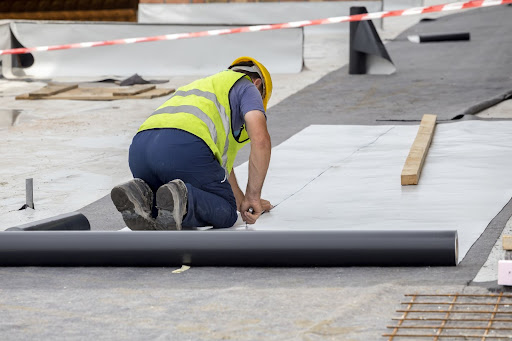
Building owners and property managers have a wide range of alternatives when it comes to commercial roofing. Thermoplastic olefin (TPO) and polyvinyl chloride (PVC) roofing are two of the most often used forms of commercial roofing.
While both types of materials are common options, some significant distinctions between them should be considered when choosing the best roofing system for your project.
TPO Vs. PVC Roofing: Difference In Details
TPO Roofing
Polypropylene and ethylene-propylene rubber are combined to create TPO roofing, a single-ply roofing membrane. It is a well-liked option for commercial roofing because of its cost, durability, and energy efficiency. TPO roofing may be purchased in a range of thicknesses, and it is commonly placed in broadsheets that are heat welded together.
Advantages Of TPO Roofing
Energy efficiency is one of the main benefits of TPO roofing. TPO roofing is made to reflect heat and sunshine, which lowers cooling expenditures in warm weather. Additionally, it is resistant to dirt, algae, and other types of detritus, making maintenance and cleaning simple. TPO roofing is also renowned for its strength and resilience to impacts, rips, and punctures.
Disadvantages Of TPO Roofing
The sensitivity of TPO roofing to weathering and disintegration over time is one of its key drawbacks. The membrane may become brittle and break, as a result, endangering the structural integrity of the roof. TPO roofing is also less chemically resistant than other commercial roofing materials, which may result in deterioration over time.
PVC Roofing
PVC roofing is a single-ply roofing membrane constructed from the material polyvinyl chloride. PVC roofing, like TPO roofing, is offered in a range of thicknesses and is normally put in sizable sheets that are heat welded together. PVC roofing is renowned for its chemical resistance, durability, and energy economy.
Advantages Of PVC Roofing
PVC roofing’s resilience to weathering and deterioration over time is one of its main benefits. PVC roofing is a fantastic option for structures in regions with harsh weather since it is incredibly strong and resistant to breaking. Daytona commercial roof maintenance has a long lifespan because of its excellent resistance to pollutants and other types of harm.
Disadvantages Of PVC Roofing
PVC roofing has a greater cost when compared to other commercial roofing materials, which is one of its key drawbacks. Furthermore, due to its rigidity, PVC roofing may be more challenging to install than other forms of roofing. Given that PVC is comprised of plastic and might take a while to decompose in a landfill, it is not as ecologically beneficial as other types of roofing materials.
Choosing The Right Roofing System
The local climate, the size and shape of your structure, and your budget should all be taken into account when choosing a commercial roofing system. Property managers might consider TPO roofing for structures in warm climates when seeking a reasonably priced, energy-efficient roofing alternative.
On the contrary, PVC roofing is preferable for buildings in regions with harsh weather, on the other hand, and for property managers searching for exceptionally durable and chemically resistant roofing.
Conclusion
The ideal option for your structure will depend on a number of factors since both TPO and PVC roofs offer benefits and drawbacks. It’s crucial to seek advice from a qualified Roofing Contractor who can evaluate your building’s demands and recommend TPO and PVC roofing.
You can make an informed choice and invest in a high-quality commercial roofing system that will offer dependable protection for years to come by working with Daytona commercial roof inspection. They can assist you in weighing the benefits and drawbacks of various materials so that you can make an informed choice that is both within your budget and appropriate for your structure.